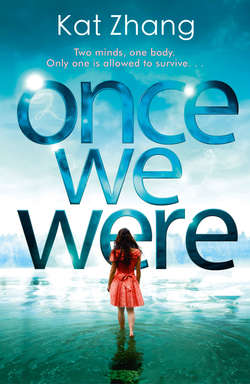Читать книгу Once We Were - Kat Zhang - Страница 6
PROLOGUE
ОглавлениеWe share a heart, Addie and I. We own the same pair of hands. Inhabit the same limbs. That hot June day, freshly escaped from Nornand Clinic, we stood and saw the ocean for the first time through shared eyes. The wind batted our hair against our cheeks. The sand stuck to our salt-soaked skin, turning our pale legs tan.
We experienced that day as we’d experienced the past fifteen years of our lives. As Addie and Eva, Eva and Addie. Two souls sharing one body. Hybrid.
But the thing is, sharing hands doesn’t mean sharing goals. Sharing eyes doesn’t mean sharing visions. And sharing a heart doesn’t mean sharing the things we love.
Here are some of the things I loved.
The cold shock of the ocean when I stood waist-deep in the water, jumping at the crest of each oncoming wave. The sound of Kitty’s laughter when I tickled her. The breathless joy of Hally’s dancing. The way Ryan smiled when I turned to look at him and he was already looking at me.
Addie liked these things, too. But she didn’t cherish them the way I did—desperately. Because I never should have had them. Millions of recessive souls never reached age five, let alone fifteen. That was the way of the world—or so Addie and I had been taught. Two souls born to each body. One marked by genetics to disappear.
I was lucky in so many ways.
I told myself this every morning when we opened our eyes, every night before we went to sleep.
I am lucky. So lucky.
I was alive. I was, in some ways, free. In a country where hybrids were forbidden and locked away, Addie and I had escaped. And I—
I could move and speak again. Me, who had known since childhood that I was the recessive soul, destined to fade away. That my parents would mourn quietly, quickly, then move on. That they would tell themselves this was the way of the world, the way things had always been, and who were they to question the workings of nature?
Children were supposed to shed recessive souls, leaving them behind like they would one day discard their baby teeth. Just another step on the journey to adulthood.
The alternative, never settling—retaining both souls—meant staying trapped in the chaos of a perpetual childhood, never gaining the steady, rational mind of an adult who could be trusted to control her own body. How could a hybrid ever fit into society? How would she marry? Would she be able to work, with two souls pulling and yearning in two different directions? To be hybrid was to be forever unstable, forever torn.
I was twelve, two years past the government-mandated deadline, when I succumbed to the curse lettered in my genes. But I was lucky, even then. I lost control of my body, leaving Addie to command our limbs, but I never disappeared completely.
It was better than dying.
Are you all right, Addie? Mom asked, those first few weeks after I was declared gone. She spoke the words like they pinched her lips on the way out, like she didn’t want to acknowledge the fact that Addie might not be okay, even then. Addie should have been normal.
I’m fine, Addie said, even when I screamed and screamed in her head, even when she was holding me as she smiled for our parents, telling me she was sorry, begging me to be as okay as she supposedly was.
Hally and Ryan Mullan were the ones who released me from the prison of my own bones. Where would I be if Hally hadn’t convinced Addie to go home with her that afternoon? Still paralyzed. Still alone. Not entirely, because I would always have Addie, but—alone, in every other sense of the word.
<We’d be home> Addie said once, when I whispered the question to her. The words floated between our linked minds, where no one else could hear us. <Mr. Conivent wouldn’t have taken us to Nornand. We wouldn’t be here.>
Here in Anchoit, this shining city by the western sea, smelling the salt the waves tossed into the air.
It had been my turn, then, to say I’m sorry. Because Addie was right. If Hally hadn’t—if I hadn’t convinced Addie to go to the Mullans’ house, to take the medication, to take that first step away from normality, we would still be home. We wouldn’t be out of danger—as hybrids, we could never truly relax—but we would be a little safer. We’d be going to school and watching movies and laughing at our little brother when he clowned around the kitchen.
<Don’t apologize, Eva. That’s not what I meant. I—> She’d hesitated, staring at the ceiling of this strange new apartment. Our new hideaway. <I never could have done it. Let you live like that. Not when I knew there was another way. And we’re out of Nornand. We’re going to be okay.>
Not like the other children who’d walked through those hospital halls. Like Jaime Cortae, who’d lost his other soul to a scalpel.
Addie and I had been lucky.
Perhaps, if we stayed lucky, we would never again have to see Mr. Conivent with his pressed, white button-up shirts. We would never again feel Jenson’s cold grip on our wrist—never come under the jurisdiction of his review board.
We would be allowed to live just as we were: Eva and Addie, Addie and Eva. Two girls inside of one.
